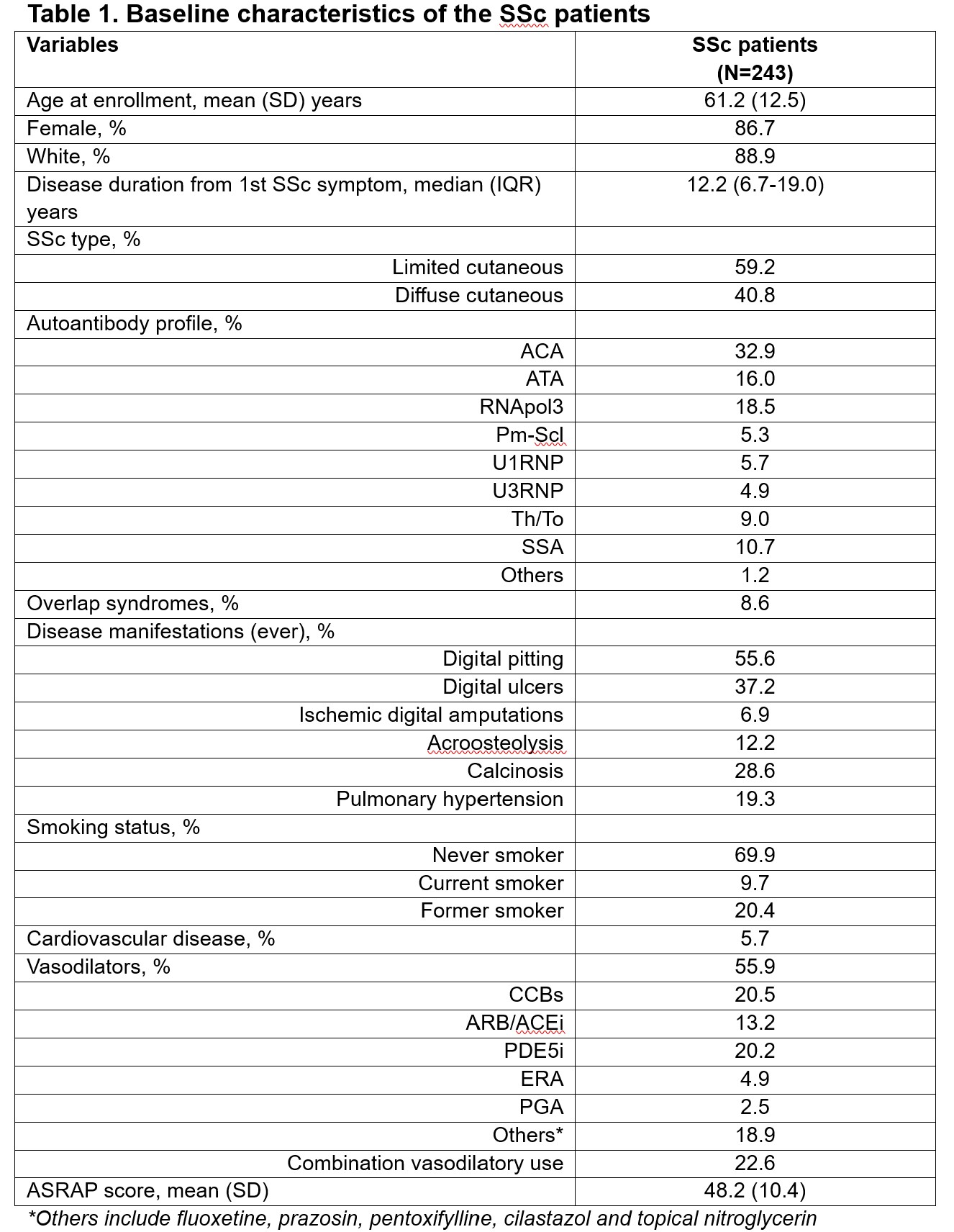Session Information
Date: Tuesday, October 28, 2025
Title: (2470–2503) Systemic Sclerosis & Related Disorders – Clinical Poster III
Session Type: Poster Session C
Session Time: 10:30AM-12:30PM
Background/Purpose: Raynaud’s phenomenon (RP) is the most common manifestation of systemic sclerosis (SSc) leading to substantial pain and impaired hand function. Establishing treatment efficacy for SSc-RP in clinical trials has been challenging, not least because of the expected seasonal variation in RP severity experienced by patients. There is very limited data on seasonal variation of SSc-RP severity. We aimed to assess how the SSc-RP severity varies throughout the year using the Assessment of SSc–Associated RP (ASRAP) questionnaire, a novel validated patient-reported instrument capturing the severity and impact of SSc-RP.
Methods: SSc patients fulfilling the 2013 ACR/EULAR classification criteria from a single Scleroderma Center completed the ASRAP questionnaire during their regular follow-up visits between October 2022 and September 2024. Data on patients’ disease characteristics, comorbidities and medications were collected. Monthly and seasonal changes in ASRAP scores (derived from calibrated items, range 20-80, cohort range 31-75), RP attack duration and frequency were assessed by disease features. Patients with ≥2 questionnaires in the follow-up were assessed for intra-individual seasonal variability of SSc-RP severity.
Results: A total of 243 SSc patients completed 407 ASRAP questionnaires. Most of the patients were Caucasian (89%) and females (87%) with limited cutaneous SSc (59%) and a median (IQR) disease duration of 12.2 (6.7-19.0) years. Digital pitting (DP) and ulcer (DU) were noted in 55% and 36% of the patients, respectively (Table 1). Mean ASRAP scores ranged from 45.4 to 50.6 throughout the year (patient-acceptable symptom state threshold=45.3), lowest in July and highest in January (Table 1, Figure). Although the difference between July and January (delta 4.7) did not reach statistical significance, this level was consistent with previously noted preliminary “Minimally important clinical difference of 4.17” (Table 2, Figure). Patients with a history of DP/DU, pulmonary hypertension (PH) had more variation in RP severity by ASRAP (higher scores in cold months than warm months) throughout the year compared to those without these conditions (Table 2, Figure). Smokers had more RP severity, as did those prescribed vasodilators. Similarly, by seasons, patients with DP/DU had significantly higher scores in winter compared to summer (52.7 [9.3] vs. 46.6 [10.9], P=0.04) unlike those without DP/DU (46.1 [8.1] vs. 46.1 [10.8], P=0.997) (Figure). Although the average daily RP attacks were more frequent and RP attack duration were longer in cold months than warms months, neither reached statistical significance (Figure). At individual patient level among those with ≥2 ASRAP questionnaires (Nf102), a similar pattern noted with more variation in those with DU/DP and vasodilator use.
Conclusion: SSc patients with evidence of more severe SSc vasculopathy (DP, DU or PH) exhibited more seasonal variation of SSc-RP severity, as did active smokers. ASRAP scores are highest (worse) in winter and lowest in summer. These findings may help SSc-RP clinical trial design informing physicians about recruitment timing, stratification by more severe vasculopathy and anticipated effect size between winter and summer.
.jpg) Figure. ASRAP score, RP attack daily frequency and duration by disease features throughout the year in patients with SSc
Figure. ASRAP score, RP attack daily frequency and duration by disease features throughout the year in patients with SSc
To cite this abstract in AMA style:
Ozen G, Yu L, Lauffoon M, Pauling J, Domsic R. Is There a Seasonal Variation in Raynaud’s Phenomenon Severity in Patients with Systemic Sclerosis? [abstract]. Arthritis Rheumatol. 2025; 77 (suppl 9). https://acrabstracts.org/abstract/is-there-a-seasonal-variation-in-raynauds-phenomenon-severity-in-patients-with-systemic-sclerosis/. Accessed .« Back to ACR Convergence 2025
ACR Meeting Abstracts - https://acrabstracts.org/abstract/is-there-a-seasonal-variation-in-raynauds-phenomenon-severity-in-patients-with-systemic-sclerosis/


.jpg)